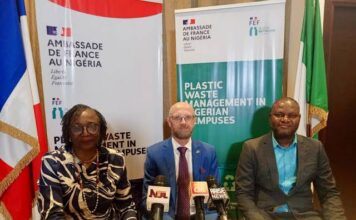On Thursday, the French Embassy kickstarted a plastic waste management initiative worth €753,000 under the umbrella of its French Embassy Fund, facilitated by the Cooperation and Cultural Department.
The venture, which encompasses 13 Nigerian universities, is geared towards fostering inventive solutions for minimizing plastic waste and promoting sustainable practices within campus environments.
The educational institutions involved in the project include Alex Ekwueme Federal University, Bayero University Kano, Nile University of Nigeria, Covenant University, Babcock University, University of Jos, Obafemi Awolowo University, University of Ibadan, University of Lagos, Yaba College of Technology, University of Calabar, University of Nsukka, and the University of Delta.
During the inaugural steering committee session in Abuja, the Acting French Ambassador to Nigeria, Jean-Francois Hasperue, underscored the pivotal role of universities in shaping the future. He affirmed that the initiative marks a significant stride towards fostering a more sustainable global ecosystem.
Hasperue articulated that the primary aim of the project is to equip Nigerian students with the tools to actively contribute to plastic waste reduction, as well as tackle environmental and climate change challenges.
Hasperue stated, “There are projects on the ground that are very important, but we have to ensure the follow-up of the Paris Agreement and make sure that the engagements taken at that location are fulfilled and followed up. And in that endeavour, we are partnering with many countries.
“We chose African countries because we believe fighting climate change deserves solidarity between the most economically advanced countries and the less economically advanced countries.
“We have put in place, through the Paris Pact for People and Planets, a system where we have engaged in funding up to $1bn, and the French contribution will be $6bn, more or less, so more than what was expected from France, to fund projects on the ground to combat poverty and at the same time fight climate change, the effects of pollution, and biodiversity erosion,” he Emphasized.
The project’s implementation over the next 18 months will feature several key elements, including the establishment of two university-based micro-plants, research initiatives focused on sustainable development, circular economy, and gender-inclusive value chains, as well as entrepreneurship support.
Additionally, a researcher exchange program between Nigeria and France will be established to facilitate knowledge sharing and collaboration, driving innovation and growth.
“Plastic waste is a pressing global issue,” said the Science and Higher Education Attache, Mr Sebastien Bede.
“Through this project, we aim to not only reduce the plastic footprint on Nigerian campuses but also to inspire a new generation of environmental stewards who can champion the cause for a plastic-free world starting with their immediate communities.”
He further said that the ultimate objective of the project is to build cooperation between French and Nigerian universities.
“I also see the opportunity that we organise a study tour in Nigerian universities, French universities, business schools, and engineering schools, to discuss cooperation, whether it’s for plastic recycling or any other areas of cooperation. We are willing to open the cooperation to more universities in Nigeria.
“A key component of this project is sustainability and that’s why I was mentioning that we have also co-designed a business model for these microplants. The total amount for this project is €753,000,” he noted.
Professor Folasade Ogunsola, the Vice-Chancellor of UNILAG, emphasized that the project’s significance extends beyond financial investment, focusing on the valuable outcomes, benefits, and impact it will bring.
He highlighted, “What drives you might not drive a young person. So, how do we make waste collection and the environment fashionable? I think it’s with the young we can find that and we have to ask them. We have to test whatever hypothesis we have, and that, you can only do on the campus in the university. So, it’s a lot of work.
“We’ve already started it at the University of Lagos. We do know that students will do it, but not every student is doing it. Right now, with what we have already done is to make about a million from waste but it’s ploughed back, and we still have a lot of waste to get rid of.
“We’re looking forward to the micro plans because it’s going to make what we do more efficient. We already have things to help with sorting, but it’s not enough. So, working with the French Government and the other French universities, we will be able to up our game, and improve the technology. We’re looking at technology that’s robust, that we can use in any way.”
Professor Abdulhameed Mambo, Dean of the Faculty of Environmental Science at Nile University of Nigeria, stated that approximately 70% of Nigeria’s waste is comprised of organic waste, primarily from food sources, while 30% is recyclable waste, including plastics, metals, and vapors.
He noted that the project, funded by the French government as part of a global effort to combat plastic pollution, aims to address this issue.
The project is expected to be fully implemented by December 2025. (Represented by Vice Chancellor Prof Dilli Dogo)
